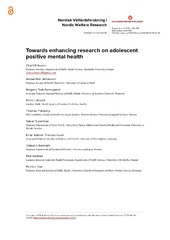| dc.contributor.author | Eriksson, Charli | |
| dc.contributor.author | Arnarsson, Ársaell Már | |
| dc.contributor.author | Damsgaard, Mogens Trab | |
| dc.contributor.author | Löfstedt, Petra | |
| dc.contributor.author | Potrebny, Thomas | |
| dc.contributor.author | Suominen, Sakari | |
| dc.contributor.author | Thorsteinsson, Einar Baldvin | |
| dc.contributor.author | Torsheim, Torbjørn | |
| dc.contributor.author | Välimaa, Raili | |
| dc.contributor.author | Due, Pernille | |
| dc.date.accessioned | 2020-04-03T06:53:28Z | |
| dc.date.available | 2020-04-03T06:53:28Z | |
| dc.date.issued | 2019-11-11 | |
| dc.Published | Eriksson C, Arnarsson ÁM, Damsgaard MT, Löfstedt P, Potrebny T, et al. Towards enhancing research on adolescent positive mental health. Nordisk välfärdsforskning | Nordic Welfare Research. 2019;4(2):113–128 | eng |
| dc.identifier.issn | 2464-4161 | |
| dc.identifier.uri | https://hdl.handle.net/1956/21670 | |
| dc.description.abstract | The positive mental health and well-being perspective represents innovative public health research of first-rank priority in Europe. Good mental health is both a state and a resource for everyday life. Hence, the concept often refers to a subjective feeling (hedonic component) as well as positive functioning (eudaimonic component). Different conceptualisations of mental health-related issues are a background to this paper, which gives a brief overview of three research issues in the Nordic countries. First, the development in the occurrences of adolescent mental health-related indicators such as life satisfaction, health, sleep, and school pressure. Second, review of Nordic methodological studies reporting on different mental health-related measures. Third, the selection of measures of positive mental health employed in the 2017–2018 Health Behaviour among School-aged Children (HBSC) data collection in the Nordic countries. Using the Nordic HBSC data for 2002–2014, it was found that symptom and problem-oriented analyses of mental health can improve our understanding of the challenges adolescents face. However, there is also a need to examine positive aspects of mental health in order to enhance our understanding of different mental health-related dimensions. New measures were included in the 2017–18 HBSC data collection in the Nordic countries, enabling researchers to answer different research questions including analysing factors mediating and moderating positive mental health among school-aged children. Extending the perspective from a symptom- and problem-oriented view to a more positive and asset-based perspective adds additional value to studies of mental health. | en_US |
| dc.language.iso | eng | eng |
| dc.publisher | Universitetsforlaget | eng |
| dc.rights | Attribution CC BY-NC | eng |
| dc.rights.uri | http://creativecommons.org/licenses/by-nc/4.0/ | eng |
| dc.subject | positive mental health | eng |
| dc.subject | measurement tools | eng |
| dc.subject | adolescents | eng |
| dc.subject | epidemiologic methods | eng |
| dc.subject | Nordic countries | eng |
| dc.title | Towards enhancing research on adolescent positive mental health | eng |
| dc.type | Peer reviewed | |
| dc.type | Journal article | |
| dc.date.updated | 2020-01-31T13:51:23Z | |
| dc.description.version | publishedVersion | |
| dc.rights.holder | Copyright 2019 The Author(s) | eng |
| dc.identifier.doi | https://doi.org/10.18261/issn.2464-4161-2019-02-08 | |
| dc.identifier.cristin | 1751289 | |
| dc.source.journal | Nordisk välfärdsforskning | Nordic Welfare Research | |

